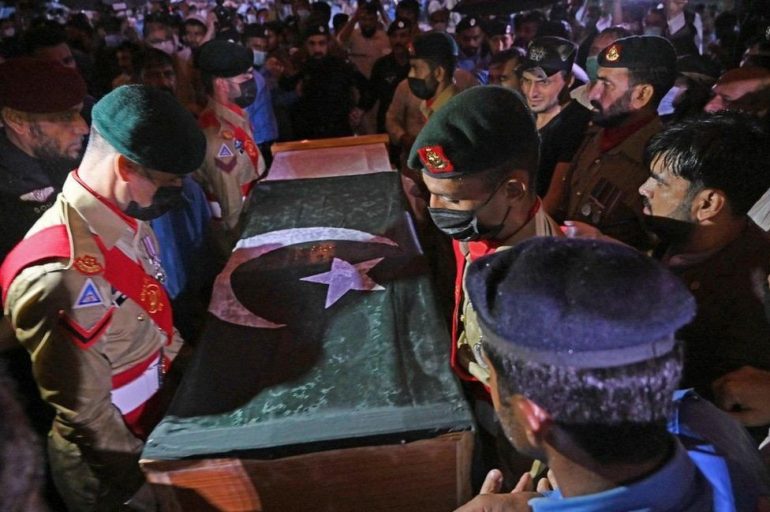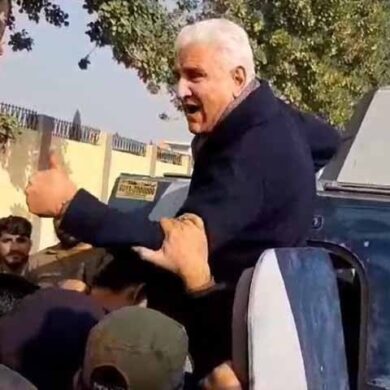Dr. Abdul Qadeer Khan, a nuclear scientist and a national icon died on Sunday (10 October) morning in Islamabad at the age of 85. He was laid to rest in the H-8 cemetery after receiving a formal funeral at the Faisal Mosque.
He was admitted to a local hospital, where his health deteriorated early the next morning, according to Radio Pakistan. He died after being taken to a hospital with lung difficulties, according to PTV.
The funeral was attended by several people that included:
- Cabinet members.
- Parliamentarians.
- Military officers.
Interior Minister Sheikh Rashid Ahmed, while obliging the orders of the Prime Minister accorded Dr. Abdul Qadeer Khan with a state funeral.
Furthermore, the interior minister, while speaking to the media said that Imran Khan directed the cabinet members to attend the funeral of Dr. Abdul Qdeer Khan. In addition, sheikh Rasheed also said that the service chiefs and the Chairman Joint Chiefs of Staff Committee would be in attendance.
Two graves were planned, according to Rashid, one at Faisal Mosque and the other in the H-8 cemetery. He later stated that his family had chosen that he would be buried at the H-8 cemetery in accordance with his wishes.
Sheikh Rasheed also announced that “The whole nation is grieving.” Moreover, he added that the flag would be flown at half-mast.
He further stated that he had asked law enforcement agencies and the commissioner of Islamabad to make security arrangements.
National Hero for Pakistanis
Dr. Abdul Qadeer Khan was a national icon and loved by the nation, according to Prime Minister Imran Khan, because of his crucial role in making Pakistan a nuclear weapons state.
The Prime Minister said that he “provided us security against an aggressive much larger nuclear neighbor. For the people of Pakistan, he was a national icon.” He also added that “He will be buried in Faisal Mosque as per his wishes. My condolences & prayers go to his family.”
Dr. Arif Alvi, the president, stated that he had known Dr. Khan since 1982. He said, “He helped us develop nation-saving nuclear deterrence, and a grateful nation will never forget his services in this regard.”
Dr. Khan stated last month that while he was receiving treatment in a hospital, neither Prime Minister Imran nor any of his cabinet members inquired about his health.
Dr. Khan was hospitalized at Khan Research Laboratories Hospital on August 26 after testing positive for Covid-19, according to Pakistan’s state-run Associated Press. He was then transferred to a military hospital in Rawalpindi, where he recovered from the illness before being discharged.
ISPR
Chairman Joint Chiefs of Staff Committee General Nadeem Raza and all military chiefs expressed grief over Dr. Khan’s death, according to a statement released by the Inter-Services Public Relations (ISPR).
General Qamar Javed Bajwa, the Chief of Army Staff, was reported in the ISPR release as stating that Dr. Abdul Qadeer Khan had provided essential contributions to boost Pakistan’s defense capabilities.
Shehbaz Sharif, the National Assembly’s Leader of the Opposition, said the country has lost “a true benefactor who served the motherland with heart and soul.”
Shehbaz Sharif, the National Assembly’s Leader of the Opposition, said the country has lost “a true benefactor who served the motherland with heart and soul.”
He said, “Pakistan will always remember his contributions to the country! He has greatly aided the nation’s defense capabilities, and we owe him a debt of gratitude.”
Asad Umar, the Minister of Planning and Development, said Dr. Khan played a major role in making the country “invincible.” He also said a few words of prayer for the deceased.
Many Pakistani Nationalists took to Twitter to express their sorrow over the loss of Dr. Abdul Qadeer Khan.
Dr. Abdul Qadeer Khan
Dr. Abdul Qadeer Khan was born in Bhopal, India in 1936. He migrated with his family to Pakistan after the partition of the subcontinent in 1947.
In 1960, he did a science degree in science from Karachi University, then went on to study metallurgical engineering in Berlin before finishing postgraduate studies in the Netherlands and Belgium.
In 1964, he married Hendrina Reterink, a British national born in South Africa to Dutch expatriate parents. They had two daughters together.
After learning of India’s nuclear test in 1974, he had joined the nation’s clandestine efforts to develop nuclear power.
He joined his hands with the country (Pakistan), after learning of India’s nuclear test in 1974, in the covert attempts if making Pakistan a nuclear power. According to Radio Pakistan, he formed the Khan Research Laboratories in 1976 and served as its main scientist and director for many years.
Islamabad is thought to have quietly developed its nuclear program in the 1980s under Dr. Qadeer’s guidance but did not test it until May 1998.
Dr. Abdul Qadeer Khan, for his contributions to the country, received the Nishan-i-Imtiaz.
Dr. Khan was embroiled in a major international nuclear proliferation crisis in 2004. In a dramatic turn of events, he was accused of heading a rogue nuclear proliferation network by the then-army leader and president Pervez Musharraf.
A recorded confession by Khan was aired shortly after Musharraf’s declaration, in which he acknowledged sole responsibility for all the nuclear proliferation that had been exposed. After that, he was placed under house arrest.
In February 2009, the court lifted his house imprisonment, but he was nonetheless closely monitored and accompanied by police whenever he left his residence in Islamabad.
Later, he filed a petition in the Lahore High Court, requesting that his fundamental rights, including freedom of movement, be upheld. In 2019, the LHC dismissed the petition, claiming that it lacked jurisdiction due to the state’s specific security measures.
He subsequently appealed to the Supreme Court against the LHC’s ruling, which had requested that the attorney general meets with the nuclear expert to assuage his fears.



